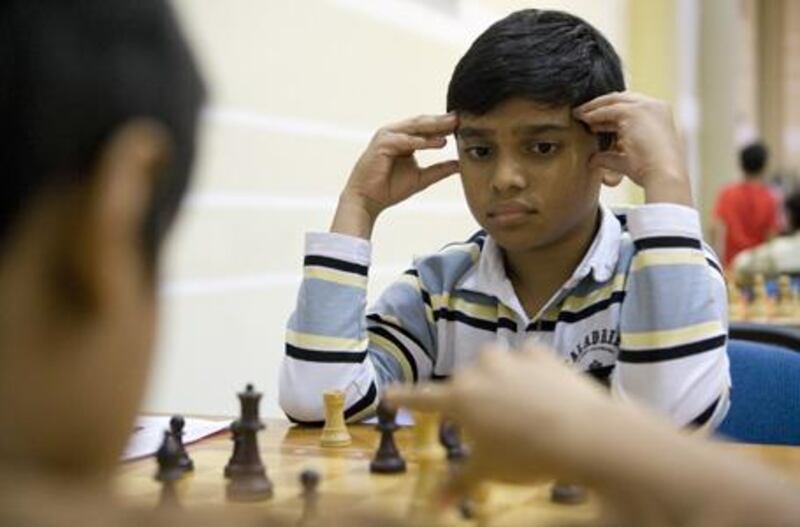Day one of the Dubai Junior Open Chess Championship. Watching 59 pairs of children silently and simultaneously shake hands across 59 chess boards is a sobering sight - if only because 10-year-olds don't usually appear as calm and composed as diplomats. Some adults attending the first round of the Dubai Junior Open Chess Championship this Tuesday seemed compelled, in the face of all the youthful competence on display, to own up to their own frivolousness. One father shook his head vigorously when asked whether he played the game like his daughter. "No, no!" he said sheepishly, "not professional."
And indeed, "professional" was a word commonly used to describe the players at the championship, who hail from 15 countries and range in age from seven to 14, and who are competing this week for $10,000 (Dh36,700) in prizes. 89 of the 135 players hail from the UAE. Just before the competition began, Shadan Ghavam Mostafavi, 14, a willowy Iranian girl in braces, glasses and a grey hooded sweatshirt, sat with her mother at a small cafeteria table outside the tournament hall. A crumpled KitKat wrapper sat in front of her. She confessed that she felt somewhat nervous. "A little," she said with a smile and a shrug.
"If she plays well in this tournament," explained her mother, "she will get an international rating." A little after 6pm, the championship got underway with the aforementioned handshake. The children were spread out at 59 tables across a sprawling room at the Dubai Chess and Culture Club. On every table was chess set, a game clock, a couple of pens and two carbon-copied score sheets on which the players noted down their moves.
Even as photographers and men with bulky video cameras patrolled the hall, awkwardly crouching down and swooping their lenses in on individual games, the kids seemed remarkably unfazed. Move a piece, hit the clock, jot it down. Most players used the plain black pens provided by the tournament - but Goryachkina Aleksandra, 11, wielded a white ballpoint bedecked with multicoloured hearts and glitter. She wore thin-strapped turquoise sandals, a pale mint-green tank top and a white baseball cap with the word "Russia" splayed across the front. Under her chair lay a tiny lavender purse covered in cartoon characters.
"She's a top player," whispered Ravi Kumar, the coach of the UAE national team and one of the event's organisers. "Among the girls, she is the top seed." Sitting at the table next to her was a very small, round-faced South Asian boy in a purple T-shirt that said "Rock Superstar", whose feet did not touch the ground. Just two tables down from him was an identical round-faced South Asian boy in a purple T-shirt that said "Rock Superstar", whose feet did not touch the ground. "Twins," whispered Kumar, their chess teacher. "You can't make out who is who!" (The brothers are all of seven years old.)
While most of the tables were arrayed on the floor, one chess match was playing out on the dais at the front of the room. It was between Bajarani Ulvi of Azerbaijan, the top-ranked player in the tournament, and an unfortunate soul who had been picked randomly from the alphabetic list of players. The other player struggled with each move; Ulvi, meanwhile, restlessly got up from the board between his moves as if he were being forced to watch a ten-minute TV show broken up by 50 minutes of commercial breaks.
Soon the games started coming to their ends. One tiny girl in pigtails and glasses - who had spent most of her game kneeling on her chair - lost to her opponent, cleaned up her chess set and contentedly set out for the refreshments table. By the time the balance tipped and most games were over, the Dubai Chess Club was crowded with kids buzzing with energy after their long bouts of silent focus. By 8.00pm, squashed French fries littered the floor.
Shadan, the willowy Iranian girl, ended her game in a draw. A crowd was gathered around Goryachkina with the glittery pen, whose game was one of the last still going. But a competing crowd was growing in the cafeteria. Several boys were clustered around a computer terminal, where two at a time were playing video games. Among the riveted audience members was Bajarani Ulvi, who was too focused on the screen to elaborate much on his game. ("I won, I won," he said with boredom.) In the end, the little group did not reach a consensus as to which was more fun: chess or Avatar: the Last Air Bender.
* John Gravois





